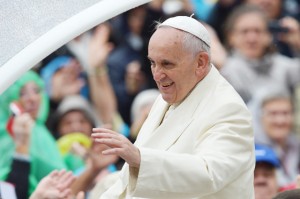Some Catholic bishops have expressed concern for the safety of Pope Francis when he visits the Philippines early next year amid threats by the jihadist group Islamic State in Iraq and Syria (ISIS) to kill him.
Basilan Bishop Martin Jumuad said the government should not take ISIS’ threat lightly, and must ensure the security of the pontiff while he is in the country.
The Pope will arrive on January 15 and will stay for five days. While his schedule has not been fully set, he is expected to spend time with the survivors of Typhoon Yolanda in Tacloban City, Leyte, in the country’s Central Visayas region.
Jumuad said photos of supposedly ISIS recruits in Mindanao in southern Philippines that have been circulating online were “extremely alarming.”
President Benigno Aquino 3rd earlier said Philippine security forces were directed to “double the effort” to protect Francis during his visit.
“I want to see them double the effort especially for the head of the Holy Mother Church. There shouldn’t be any incident while he’s in our country,” Aquino said in a report.
He made the statements after Iraq’s ambassador to the Vatican, Habeeb Al Sadr, warned him that the ISIS was planning to assassinate the Pope during one of his overseas trips.
“What has been declared by the self-declared Islamic State is clear, they want to kill the Pope. The threats against the Pope are credible,” Al Sadrhad had said.
Cubao Bishop Honesty Ontiongco raised the same concern as
Jumuad’s, saying “the government should take some precautionary measures for the safety of Pope Francis.”
Another pope, John Paul II, was the target of assassins when he visited the country in 1995.
At the time, the emerging al-Qaeda had launched Oplan Bojinka, a plot to plant bombs on airliners flying from Asian destinations to the US. A cell was set up in Manila to experiment with different devices.
Part of the plot called for the assassination of John Paul II as a diversion to make it easier for the terrorists to sneak the explosives into the planes.
The plot was foiled, and at least one suspect was arrested.
The military maintains that there is no hard proof that the ISIS was recruiting in Mindanao, despite confirmation by at least two mayors in the area.
“We treat information [as] only accurate if validated, and so far, there are no reports or names of Filipinos that are in the Middle East fighting for ISIS nor is there any recruitment here in the Philippines,” Lt. Col. Ramon Zagala, chief of the Armed Forces of the Philippines’ (AFP) Public Affairs Office, told The Manila Times on Friday.
Zagala said as far as the Armed Forces is concerned, there is no ISIS presence in the Philippines, although the group has sympathizers, such as the Abu Sayyaf and the Bangsamoro Islamic Freedom Fighters (BIFF), a breakaway group of the Moro Islamic Liberation Front (MILF).
But he added that the military “will coordinate if need be with all sources so that the information on ISIS recruitment could be processed and validated.”
The latest to confirm the recruitment efforts of ISIS was Mayor Joel Maturan of Ungkaya Pukan town in Basilan, a bailiwick of the Abu Sayyaf.
Davao City Mayor Eduardo Duterte also earlier said there were Muslim fighters recruited from his city who left for the Middle East last July to fight under the jihadist banner.
Defense Secretary Voltaire Gazmin said the report of Mayor Maturan was very deserving but “we have not had any confirmation on this.”
Lt. Gen. Rustico Guerrero, commander of Western Mindanao Command, said they have no specific reports about ISIS-related activities in the region.
“Let us not give them the media attention they need. That is what terrorists need to create fear,” Guerrero added.
Immigration Commissioner Siegfred Mison was not taking chances, however.
Also on Friday, Mison instructed his men, especially those assigned in international airports, to be extra vigilant and impose stricter screening procedures on arriving foreign tourists and Filipinos returning from strife- torn Middle East countries.
His order came amid concerns that some ISIS members could have slipped into the country and are recruiting new members in Mindanao.
In an interview aired over dzMM radio station, Mison said they are closely coordinating with the Department of Foreign Affairs (DFA) and other agencies especially those from the intelligence community to obtain a credible list of personalities believed involved or connected with ISIS.
He added that they are not on red alert but are just being very watchful and are implementing the stricter measures in a very subtle manner.
Mison admitted to having heard of reports about Filipinos who left the country to train with ISIS and then coming back to form their own ISIS cells “but those [reports] have no confirmation yet from the intelligence agencies.”
With a report from WILLIAM B. DEPASUPIL


